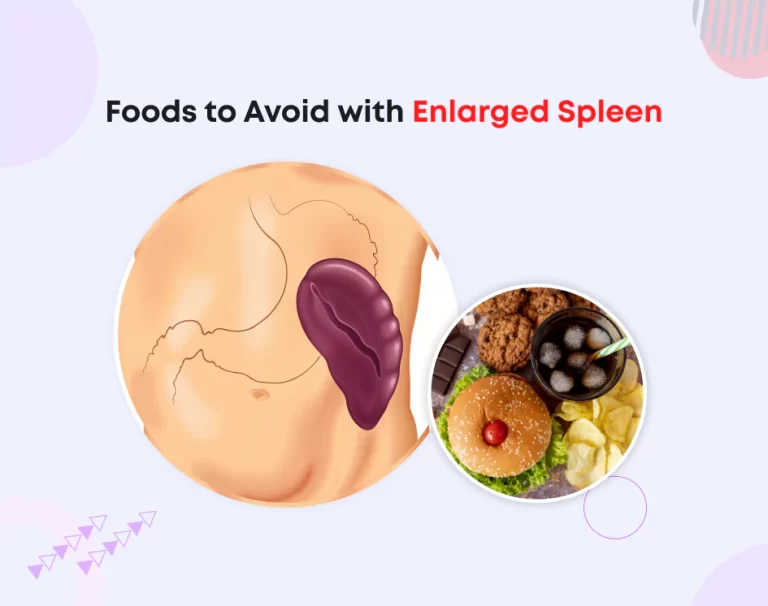An enlarged spleen, medically called splenomegaly, is a condition that signals underlying health issues—ranging from infections to liver diseases. Our spleen plays a big role in filtering blood, fighting bacteria, and managing red blood cells. When it becomes enlarged, its ability to function properly is impaired, leading to fatigue, immune dysfunction, and in some cases, pain or fullness in the abdomen.
If you’re managing splenomegaly, your diet plays a critical role in recovery. Knowing what to eat—and more importantly, what foods to avoid with an enlarged spleen—can help you reduce inflammation, relieve pressure on the spleen, and promote faster healing.
In this article, you’ll learn:
- The worst foods for spleen health
- A spleen-friendly diet approach
- Lifestyle tips to support spleen recovery
What Causes an Enlarged Spleen?
Before jumping into the food list, it’s important to understand why the spleen might become enlarged. Some common causes include:
- Infections (viral like mononucleosis or bacterial like syphilis)
- Liver diseases such as cirrhosis or hepatitis
- Blood cancers like leukemia or lymphoma
- Autoimmune conditions like lupus or rheumatoid arthritis
- Parasitic diseases such as malaria
- Storage diseases (rare metabolic disorders)
These conditions trigger inflammation or overload the spleen’s filtering system, causing it to swell. Managing the root cause medically is crucial—but supporting your body with the right diet can ease the burden on the spleen.
Why Diet Matters for Spleen Health?
The spleen is part of both the lymphatic and immune systems, meaning it plays a dual role in protecting your body and cleaning your blood. A poor diet can:
- Increase inflammation
- Weaken immunity
- Overwork the liver and spleen
- Impair digestion and blood purification
That’s why avoiding spleen-stressing foods is just as important as including healing ones.
Top 10 Foods to Avoid with Enlarged Spleen
Here are the top foods to avoid if you’re dealing with splenomegaly:
1. Fried and Greasy Foods
Fried foods contain trans fats and refined oils that trigger inflammation in the body. These slow down your digestive system, increasing pressure on your liver and spleen. Avoid:
- French fries
- Fried chicken
- Packaged snacks with hydrogenated oils
2. Red and Processed Meats
Red meat is difficult to digest and can produce excess waste in the bloodstream, making the spleen work harder. Processed meats also contain preservatives and nitrates that harm the immune system. Avoid:
- Beef, lamb
- Sausages, bacon
- Deli meats
3. Refined Sugars
Sugar weakens immunity and feeds harmful bacteria, which can worsen infections. High sugar intake also leads to insulin resistance, affecting overall organ health. Avoid:
- Candy
- Soda
- Pastries and cakes
4. Alcohol
Alcohol directly impacts the liver and the spleen. It causes dehydration, impairs immunity, and worsens inflammation. In liver-related spleen enlargement, alcohol can be especially dangerous. Avoid:
- Beer
- Wine
5. Dairy Products (in excess)
While some people tolerate dairy well, it can increase mucus production and inflammation in others. Full-fat versions are particularly hard on the digestive system. Avoid:
- Whole milk
- Cheese
- Cream
6. Caffeinated Beverages
Caffeine in excess can overstimulate the system, leading to dehydration and stress on the lymphatic organs like the spleen. Limit or avoid:
- Energy drinks
- Excessive coffee
- Black tea
7. Highly Processed Foods
Packaged, instant, or fast foods often contain artificial ingredients, preservatives, and high salt—none of which are spleen-friendly. Avoid:
- Instant noodles
- Microwave meals
- Flavored chips
8. Gluten-Heavy Grains
For those sensitive to gluten, wheat and barley can trigger inflammation and digestive issues. This can indirectly affect spleen performance. Avoid (if sensitive):
- White bread
- Pasta
- Baked goods with refined flour
9. Cold or Iced Foods and Drinks
In Traditional Chinese Medicine (TCM), the spleen dislikes cold. Cold drinks and raw foods can weaken digestion, which stresses the spleen. Avoid:
- Iced water
- Ice cream
- Uncooked salads (if digestion is weak)
10. Nightshade Vegetables (in some cases)
For those with autoimmune-linked spleen issues, nightshades may increase inflammation. Consider limiting:
- Tomatoes
- Eggplants
- Peppers
Spleen-Friendly Diet Tips
Now that you know what to avoid, here are some general diet guidelines that support spleen recovery:
Consume warm, cooked meals—they’re easier to digest and soothing for the spleen.
Include immune-boosting foods – Garlic, ginger, turmeric, and berries
Prioritize lean proteins such as chicken, tofu, and legumes to support spleen health.
Stay hydrated – With warm water, broths, and herbal teas
Add whole grains and vegetables – Brown rice, oats, carrots, spinach
Lifestyle Tips to Support an Enlarged Spleen
Aside from your diet, certain habits can support spleen function:
Get adequate sleep – At least 7-8 hours to allow the immune system to recharge
Avoid smoking – It lowers oxygen in the blood and stresses internal organs
Reduce stress – Chronic stress impacts digestion and inflammation
Practice gentle movement – Like walking or yoga to improve circulation
When to See a Doctor?
Diet alone isn’t enough. An enlarged spleen is a medical condition that needs proper diagnosis and treatment. Consult a healthcare provider if you experience:
- Persistent fatigue
- Pain or fullness in the upper left abdomen
- Frequent infections
- Easy bruising or bleeding
These could be signs of serious conditions like infection, anemia, or blood disorders.
Final Thoughts
Your spleen is a silent but essential organ that needs careful support, especially when enlarged. Avoiding inflammatory, hard-to-digest, and processed foods is a key step in your recovery journey. Focus on warm, nourishing, anti-inflammatory meals and support your body’s natural healing processes.
Always consult a doctor for a personalized treatment plan—and use your diet as a tool to assist medical care, not replace it.








